Nitrogen Optimization Pilot Program (NOPP) participants across Wisconsin have been busy carrying out their planned projects. Check out the project updates below to learn more about the progress being made by many of program participants.
July 9, 2024 - Muddy Bottom Farmers

Muddy Bottom Farmers, a producer-led watershed group, is a 2024 Nitrogen Optimization Pilot Program grant recipient!
Three participating farms are investigating the economical rate of nitrogen and the impacts of cover crops. Pictured are producer Jim Luedtke and collaborators Sheila Smith and Emily Dufeck, both of the Winnebago County Land & Water Conservation Department. Not pictured are producers Brian Krenke and Dan Rieckmann.
Jim Leudtke shares how this project was born and where he's hoping it'll take the Muddy Bottom Farmers: “An attendee at a past event asked us if we were seeing any decrease in yields with planting cover crops and nobody could really answer that question. And there's been a lot of talk that the cover crop ties up nitrogen and can hamper your yield so we're doing this study to find out if cover crops have a detrimental effect on your cash crop. Because of this research, now we've had a few other farmers that would like to get involved in our group. So for next year, we're looking at doing a Return on Investment (ROI) study with less sampling just to get some of the members looking at the numbers because, we've got to make money at some point in time"
As for the three farms involved in the current NOPP project, Luedtke explains that they were each drawn in with slightly different goals.
“Like, for me, as you look across the trial in late-June, as the cover crop changes, the growing crop changes. But, what effect will that have later when it's six feet tall and all looks the same? It all depends on what our yields are at the end. Dan was interested in doing it to investigate more management practices so we started at this level to learn how to do the work and then we'll probably do more as we go on. Brian was interested in it more from a no-till standpoint because we've been doing it for so long and everybody talks about the carbon to nitrogen ratio, and we don't understand that at all. Some of this explains that, if we have trash on top, how do we get that nitrogen level to the right level so that the decomposing materials get broken down."
__________________________________________________________________________________________
June 25, 2024 - Prairie Vista

Prairie Vista Cranberries LLC is a 2024 Nitrogen Optimization Pilot Program (NOPP) grant recipient! Their project investigates nitrogen application timing and rate in cranberries and is being conducted in collaboration with Allison Jonjak (UW-Madison Extension) and Jyostna Devi Mura (UW-Madison).
Christy Klieforth of Prairie Vista Cranberries said they “wanted to start this project because there hasn't been a lot of research done in our region regarding nitrogen application, as it is different than most other growing regions in the state."
Prairie Vista is in Adams County and operates in unique conditions—the soil pH is higher than what's typical for cranberries, and the irrigation water already contains high levels of nitrate. Due to these environmental conditions, Prairie Vista wonders if they can eliminate grower-applied nitrogen altogether, thereby removing excess nitrogen from irrigation water to feed the crop! However, if the trials indicates they do require additional nitrogen, their NOPP project designed to investigate at which bloom stage to apply nitrogen or even if two smaller applications is most beneficial.
__________________________________________________________________________________________
May 21, 2024 - Powell-Smith

Bill Powel-Smith is a 2023 Nitrogen Optimization Pilot Program (NOPP) grant recipient! Miltrim Farms of Marathon County and Woldt Farms of Manitowoc County are hosting on-farm trials designed to investigate commercial fertilizer supplementation for prime grass-legume crop with dairy manure.
Forage crops are a unique beast to manage and become even more complicated when you plant a grass-legume blend and add manure to the mix. As a dairy specialist, Bill Powel-Smith understands the challenges farmers face in making management decisions related to forage crops. This project is designed to investigate the optimal nitrogen rates in addition to manure applications that achieve the sweet spot of optimal yield and forage quality.
Miltrim Farms and Woldt Farms are both located in watershed-sensitive areas with ongoing collaboration with watershed groups. Limiting water runoff and groundwater contamination is a central goal of the participating farms and the work done within their respective watersheds.
__________________________________________________________________________________________
May 7, 2024 - Albright Brothers
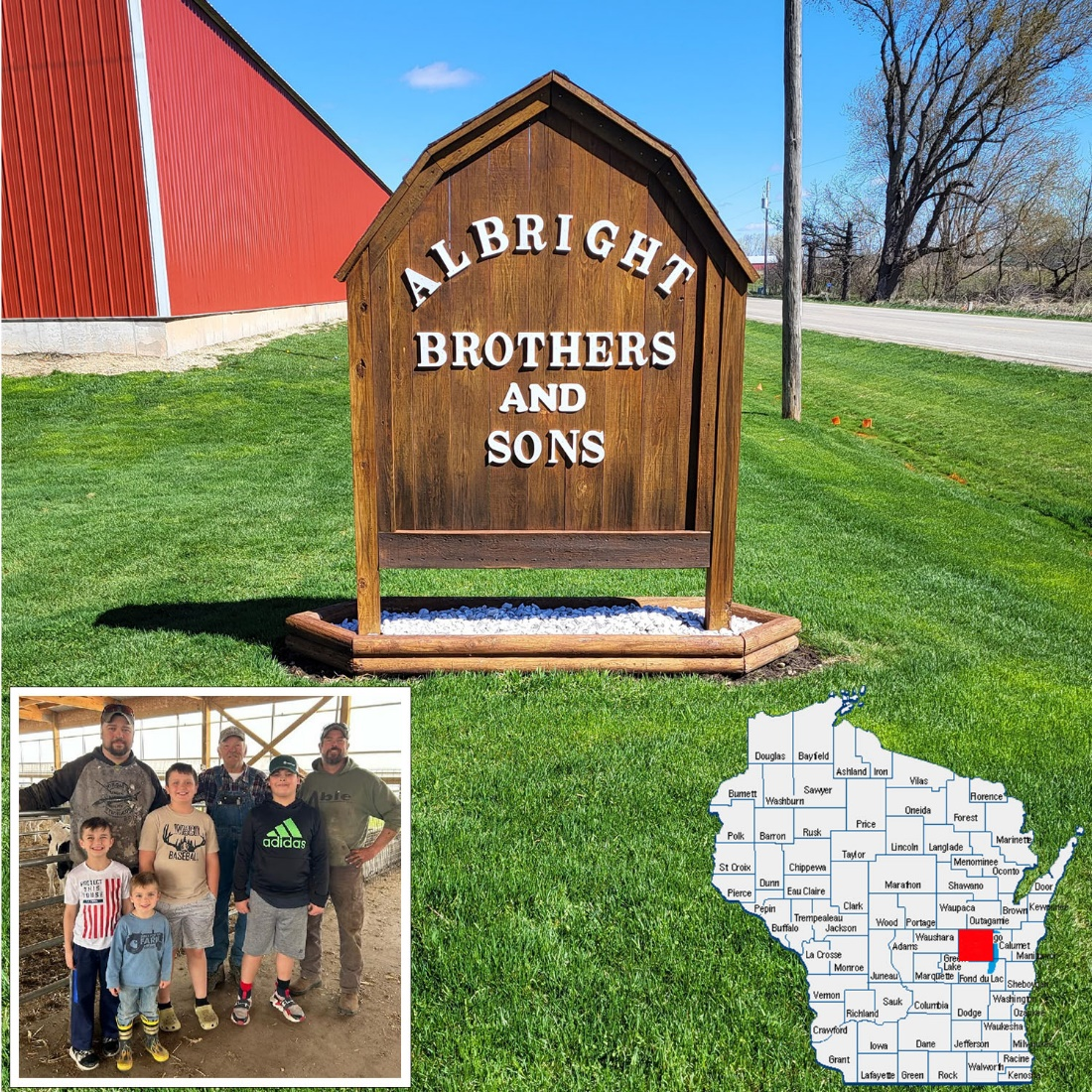
The Albright Brothers LLC, in collaboration with Winnebago County LWCD's Sheila Smith and Emily Dufeck and Extension's Kevin Jarek, is a 2024 Nitrogen Optimization Pilot Program (NOPP) grant recipient! The team is investigating nitrogen rates with solid manure. Read on to see how the idea transpired!
A long-time family "discussion" brought the Albright Brothers to the Nitrogen Optimization Pilot Program. "How much nitrogen do we need to use with different rates of manure?" They started using different conservative rates of nitrogen with mixed results. Then came the next wrench in the question. A 32% applicator was used which was accidentally set at a much higher rate than usual, and there was a very noticeable yield increase. But what about the rate of return? Jamie Albright hopes the Nitrogen Optimization Pilot Program will answer the family "discussion" and assist other farmers with the same question.
__________________________________________________________________________________________
April 23, 2024 - Dodge County HSHW
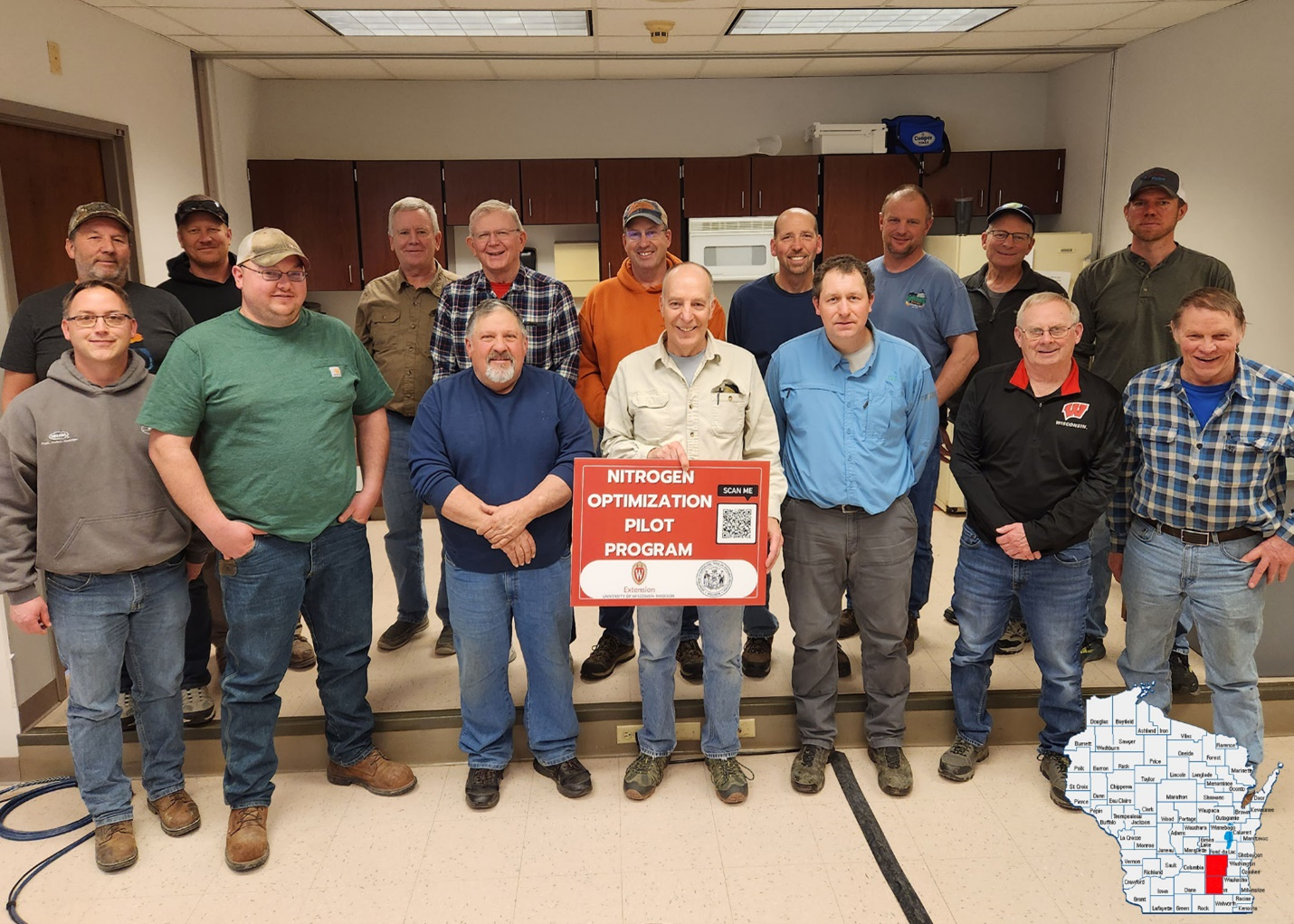
14 farmers in Dodge and Jefferson counties, led by Bill Stangel and Tony Peirick, are 2023 Nitrogen Optimization Pilot Program (NOPP) grant recipients! With a trial on each participating farm, the group is investigating nitrogen use efficiency in corn in the Rock River Basin.
The risk of groundwater contamination in an area dominated by dolomitic bedrock is a major concern and a main driver for producers in the Upper Rock River Basin to conduct nitrogen-related on-farm trials. The group has known that field-scale data can help to identify strategies that reduce losses of nitrogen to the environment while balancing profitability for farmers. This is why they began conducting Nitrogen Use Efficiency trials in 2022, but the group was grateful for a funding source in NOPP to continue the work for several more years!
When asked why they agreed to participate in the Dodge County Farmers for Healthy Soil & Healthy Water's NOPP project, one producer responded that his “agronomist of 30 years talked him into it," while another replied, “because it's fun!" It's clear that this group of producers and collaborators are wholly invested in protecting their environment, community, and farms.
__________________________________________________________________________________________
April 9, 2024 - Bibby
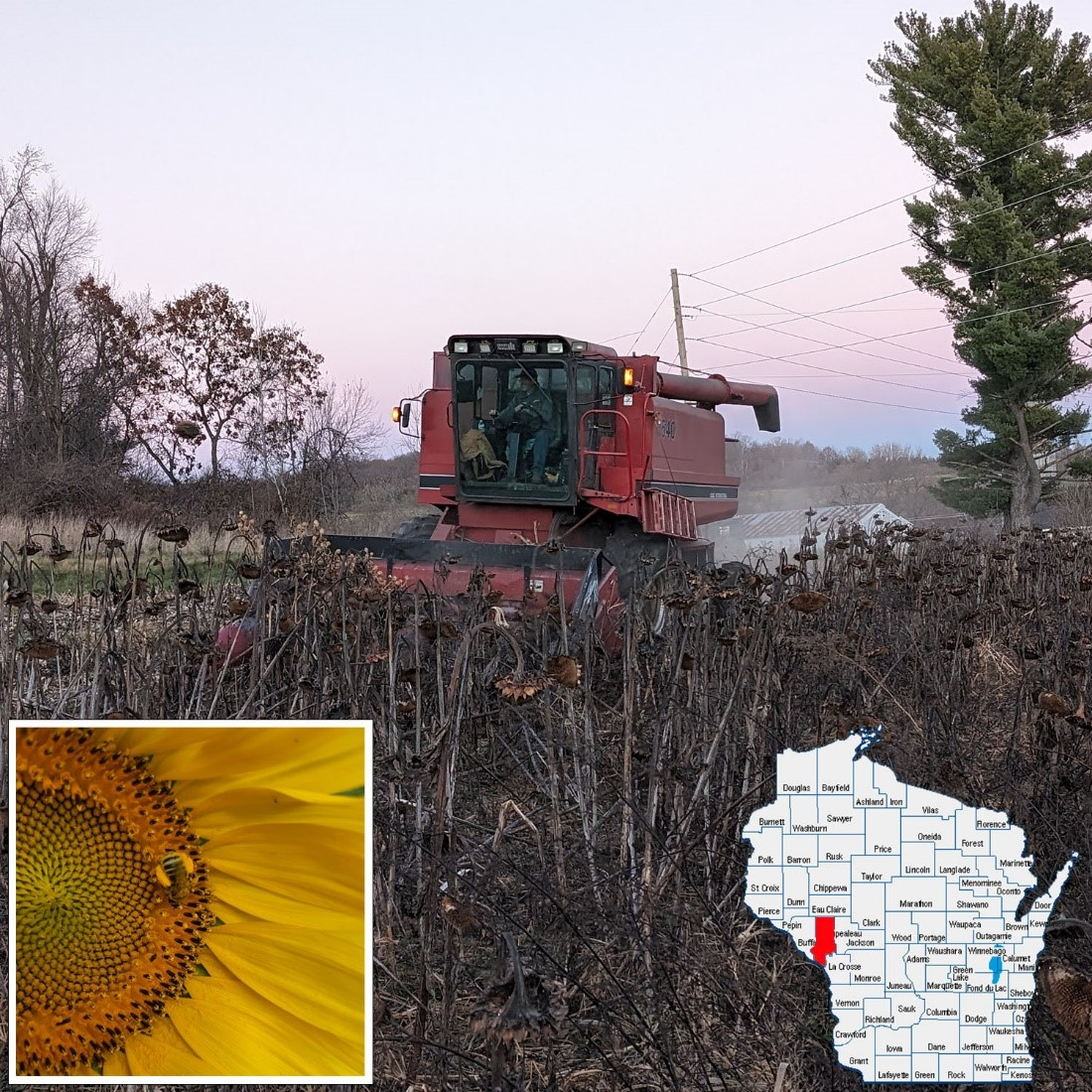
Paul Bibby, in collaboration with Extension Educators Sam Bibby and Steve Okonek, is a 2024 Nitrogen Optimization Pilot Program grant recipient! His project is designed to investigate sunflower response to nitrogen as it relates to yield, profit, and agronomic traits.
Paul and Sam said this about the project: “We are interested in growing sunflowers in the driftless region of Wisconsin because we desire more diversity across our farm. In addition to breaking up our corn/soy rotation, they look great and provide a huge food source for local pollinators. Most sunflower bird seed in our area is grown far away and shipped here. This doesn't make a lot of sense to us when it is possible to grow sunflowers right here in Wisconsin. Our plan is to sell sunflower seed as a bird food product locally either off the farm or through local stores.
Due to the lack of sunflower production in the state and surrounding area, the fertility guidelines are not well defined. Through the NOPP trial, we hope to collect some on-farm results that will help us and other potential Wisconsin sunflower farmers dial in our nitrogen rate."
__________________________________________________________________________________________
January 23, 2024 - Michael Fields Agriculture Institute

Jeff Gaska, Charlie Hammer, and Marty Weiss, in collaboration with the Division of Extension Educator Will Fulwider, are 2023 Nitrogen Optimization Pilot Program grant recipients! Their project is designed to estimate nitrogen credits from multi-species cover crops planted after wheat.
Will had this to say about the topic: “While the university has worked to dial in nitrogen crediting for frost-seeded red clover and late-summer planted legumes, farmers planting cover crops after wheat are often doing so with diverse mixes. The rationale is multifold:
1. Diverse mixes are better for soil health because of different root systems and microbe/fungus-plant associations,
2. Nitrate-scavenging grasses in mixed with legumes help to prevent nitrogen loss,
3. Flowering species support for pollinators. And the list goes on….
However, the jury is still out if these diverse cover crops planted after wheat can provide reliable nitrogen credits to corn the following season. To do so, six different farmers across Dane and Dodge counties (three funded by NOPP, three funded by SARE) planted their own cover crop mixes after wheat this past summer, leaving no-cover crop control strips. This spring, corn will be planted across all the fields and a nitrogen rate trial overlaid on the cover/no cover strips in order to determine how much additional nitrogen and corn yield response we are seeing at different rates of nitrogen fertilizer."__________________________________________________________________________________________
January 2, 2024 - Tracy and Tom Novak
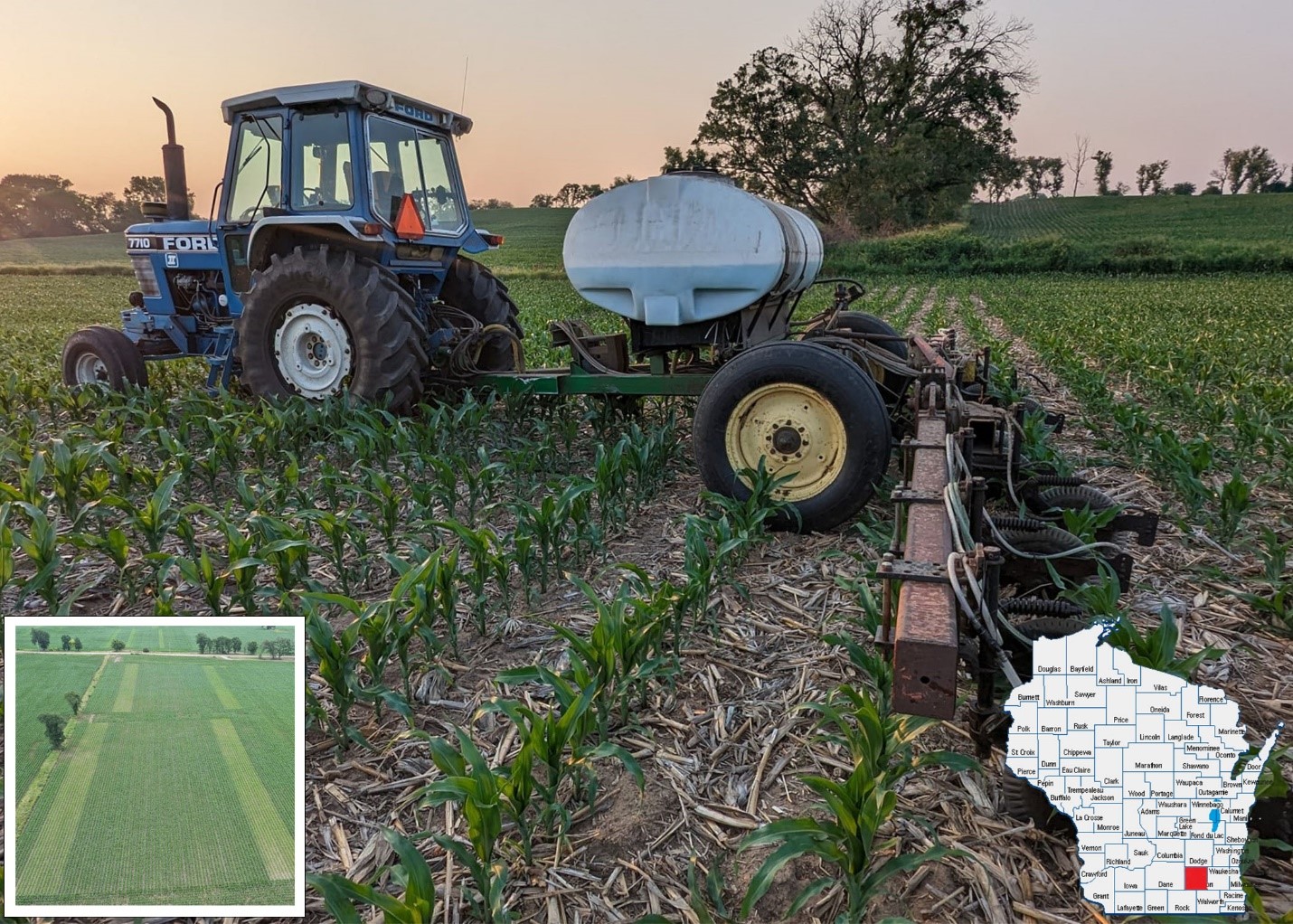
Nitrogen Optimization Pilot Program grant recipients Tracy and Tom Novak are evaluating Pivot Bio PROVEN40® over four nitrogen rates.
When asked about the inspiration to design an on-farm trial around this product, Novak had this to say: “Over my career, many products like Pivot Bio come and go. The end result, every time is the company extracts money from farmers' pockets for the product and after a few years there's no measurable yield or monetary gain for the farmer. We never hear from the rep or company again. I used to test many of the products on my own dime and about a decade ago I said no way, I'm done. It literally cost me several thousand dollars in yield loss on the last product - and I have the data to show it! Pivot Bio has made a similar splash without any yield information that I could find and only testimonials talking about the product.
So, with NOPP funding available I'm back at it using paired 12-row plots with and without Pivot Bio applied in-furrow with four different N rates. If there's promise after two years, I would like to continue the project."
__________________________________________________________________________________________
December 19, 2023 - InDepth Agronomy
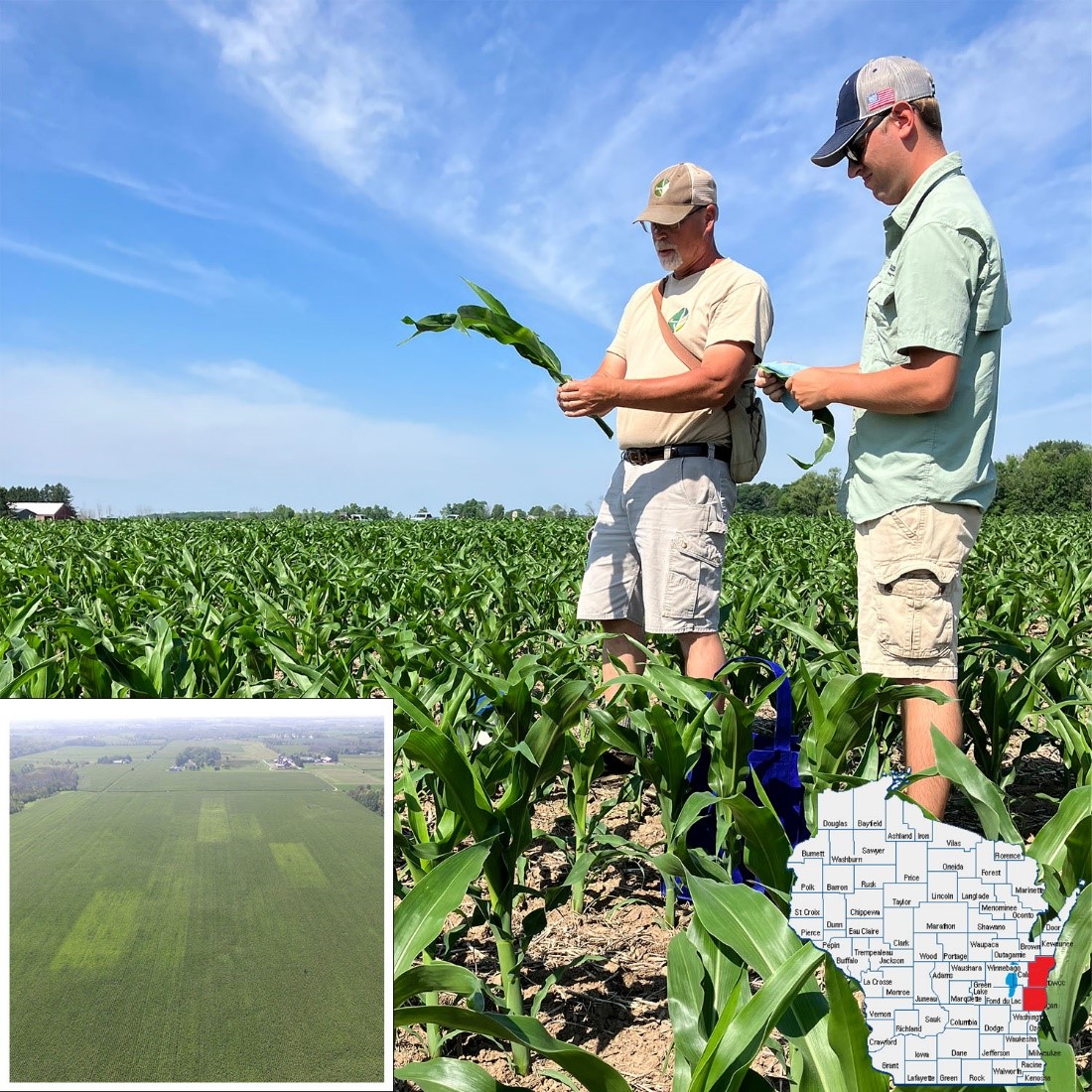
Soaring Eagle Dairy and Majestic Crossing Dairy are 2023 Nitrogen Optimization Pilot Program grant recipients and are collaborating with InDepth Agronomy on their project to evaluate corn nitrogen rates.
The soils in some areas of Eastern Wisconsin contain a higher clay content than most other areas of Wisconsin which can make nitrogen difficult to manage. This soil characteristic is what inspired these two farms to fine-tune nitrogen rate recommendations and evaluate several in-season nitrogen measurement tools.
A goal was set on this multi-year research project: for the research design and execution to fit in seamlessly with each farm's day-to-day operations. To meet this goal, the farms leveraged precision agriculture technologies that were already being used on their operation. The randomized complete block design research plots were installed using variable rate fertilizing prescriptions either as a single pre-plant application, or as a several applications throughout the year. These large plots allowed for normal planting and combining operations without specific regard to the location of the plots. The yield data is currently being analyzed and we look forward to sharing the first-year results.
In addition to determining optimum nitrogen rates for corn yield, the research design also evaluates several in-season nitrogen management tools such as: NDVI, GreenSeeker, PSNT, PPNT, Tissue Testing, and Stalk Nitrate sampling. The farms hope to narrow in on several tools that have a strong predictive measurement of corn nitrogen needs to scale this research across their farm.
__________________________________________________________________________________________
November 21, 2023 - Hebbe

Jim Hebbe is a 2023 Nitrogen Optimization Pilot Program grant recipient evaluating a biological nitrogen product in maintaining corn yield. When asked why he chose to apply for a grant to study this topic, Jim said it had a lot to do with lack of available research:
“My normal source of info for a lot of farm decisions starts with UW. So I contacted our local Extension Educator, Natasha Paris, and asked what the university is saying about Pivot Bio PROVEN® 40. Unfortunately, there wasn't any university research to help make a good decision. All of a sudden, the NOPP grant was announced, and we thought this would be a wonderful thing to do. Natasha provided the support and confidence that we could do this together."
The responsibility of using nitrogen efficiently is something that Jim takes very seriously.
“I've worked with Matt Ruark through the years on nitrogen plots on our farm and always thought this was a good thing to do. We drink our groundwater too and we certainly don't want to be overapplying nitrogen. It's exciting to think that, if a product like [Pivot Bio PROVEN® 40] can and will work, I love the idea of 40 units of nitrogen that isn't needing to be produced with fossil fuel. We want to have confidence that things are done correctly. With myself being the consumer of nitrogen, I'm going to be critical of decisions and use of nitrogen because I'm the stakeholder."
__________________________________________________________________________________________
November 7, 2023 - Novak (Soil Types)
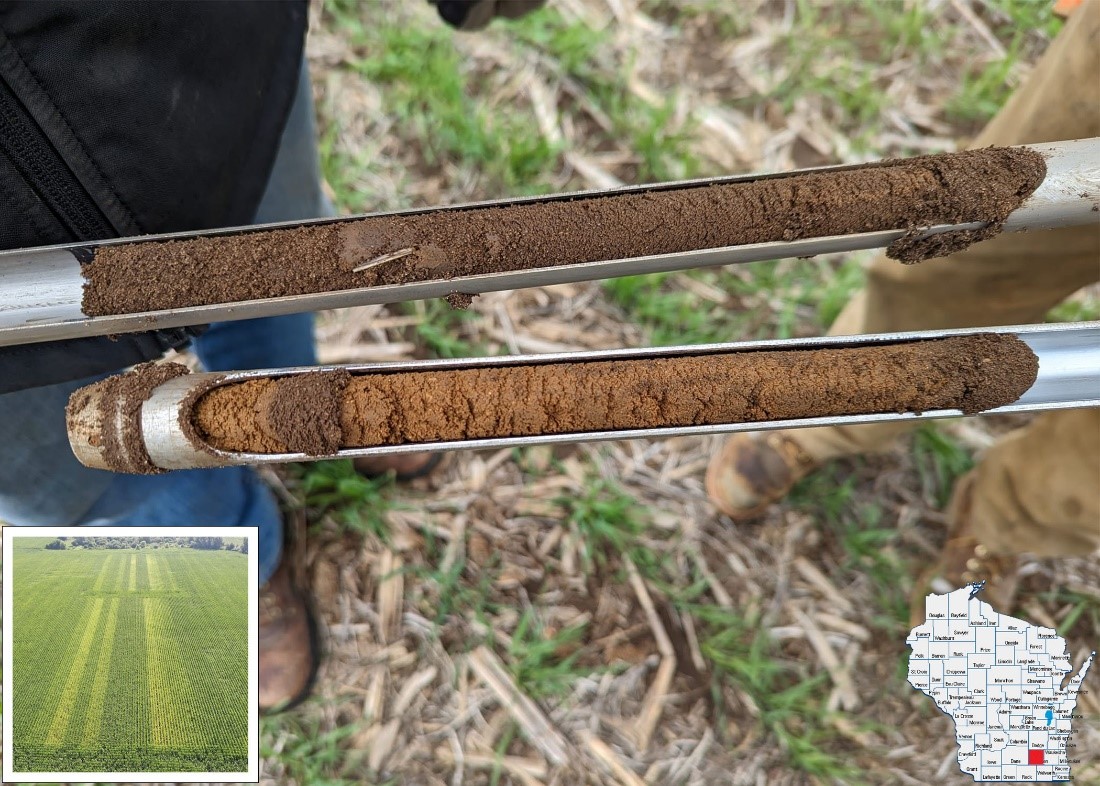
Tom Novak is a 2023 Nitrogen Optimization Pilot Program grant recipient evaluating corn MRTN rates on coarse vs loam soil types. Novak had this to say about his long history of on-farm research and why it’s important to keep asking questions: “Back in the late 90's, I teamed up doing N rate trials with our Jefferson County Crops and Soils agent, Matt Hanson, and we continued trials for the next 10 years. One of the results taught us that being efficient with N use (side-dressing) was extremely important when discussing what the 'correct' N rate should be. This decade of trials also showed us the UW-recommended rates were adequate. However, some things, like non-responsive trials, nagged at us and we never got the 'why' figured out. Flash forward to the present day, and with a good funding source in place, we can run different tests, like preplant N, pre-sidedress N, ear leaf samples, and more, which were too expensive when we had no budget! This will help us understand the 'why' when odd things happen.
The new twist over this two-year project is beyond getting yield data over six N rates; I'm comparing light sandy loam soils to some black loam soils to see if optimum N rates at each yield level is the same, or if not, can we get by with less N on lighter/droughty soils as some variable rate models suggest.”
__________________________________________________________________________________________
October 24, 2023 - Blank
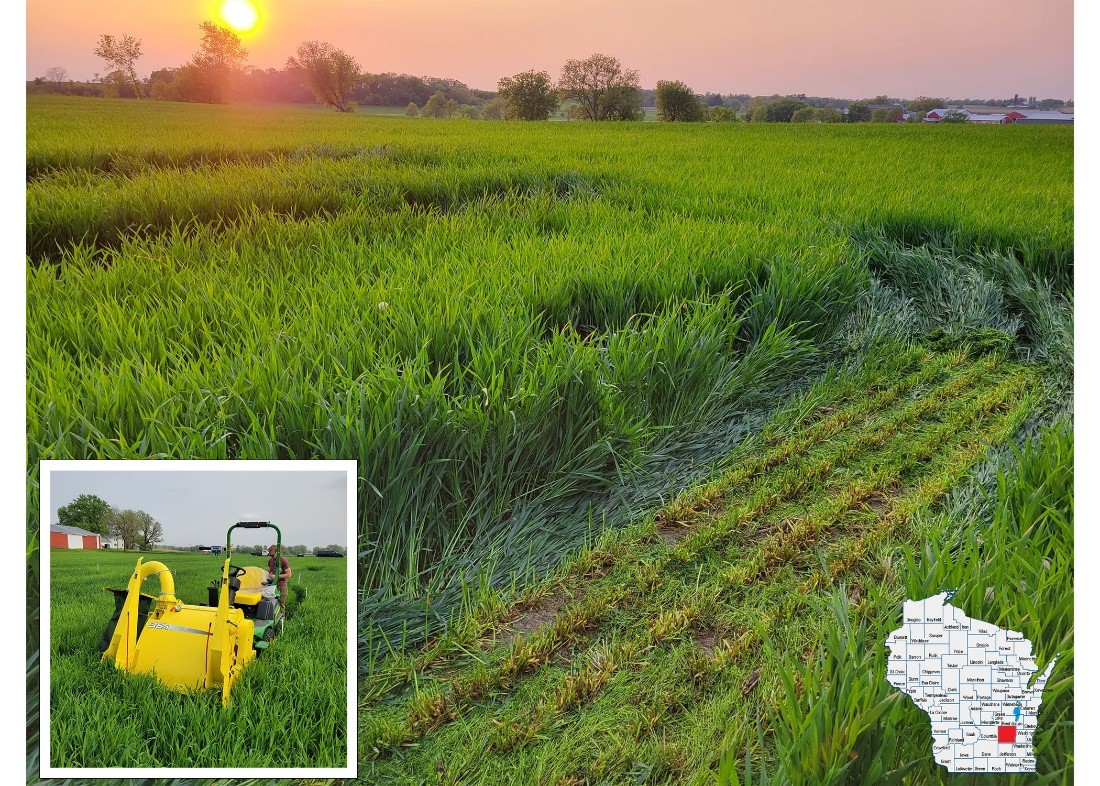
Brendon Blank is a 2023 Nitrogen Optimization Pilot Program grant recipient with a project titled “N rate for best Winter Triticale forage yield, quality, and phosphorous removal". Partnering with three farms in Dodge County, Brendon is hoping to find answers to some of his questions:
"I see winter triticale as a growing interest in dairies and there has been a lot of success with it but, there have also been failures and disappointments, so we want to finetune what makes the system work best. From the nitrogen standpoint, the grasses are unique in the fact that, the more nitrogen you put on, the more you increase protein level of the crop. This makes it more difficult to determine the economic plateau – it's a more dynamic system with more work to figure out where the plateau is. Can we fertilize beyond our yield plateau economically? Is it more economical to fertilize to yield or quality?
I also think about the nutrient management aspect of it from a manure standpoint – can we pull more phosphorus out of the system? From a soil health standpoint, it can be beneficial in the long-term, but [adding a crop] results in a new management system with different timings. If we give up corn silage yield [to accommodate triticale planting], are we getting something back in triticale yield?"
__________________________________________________________________________________________
October 3, 2023 - LASA
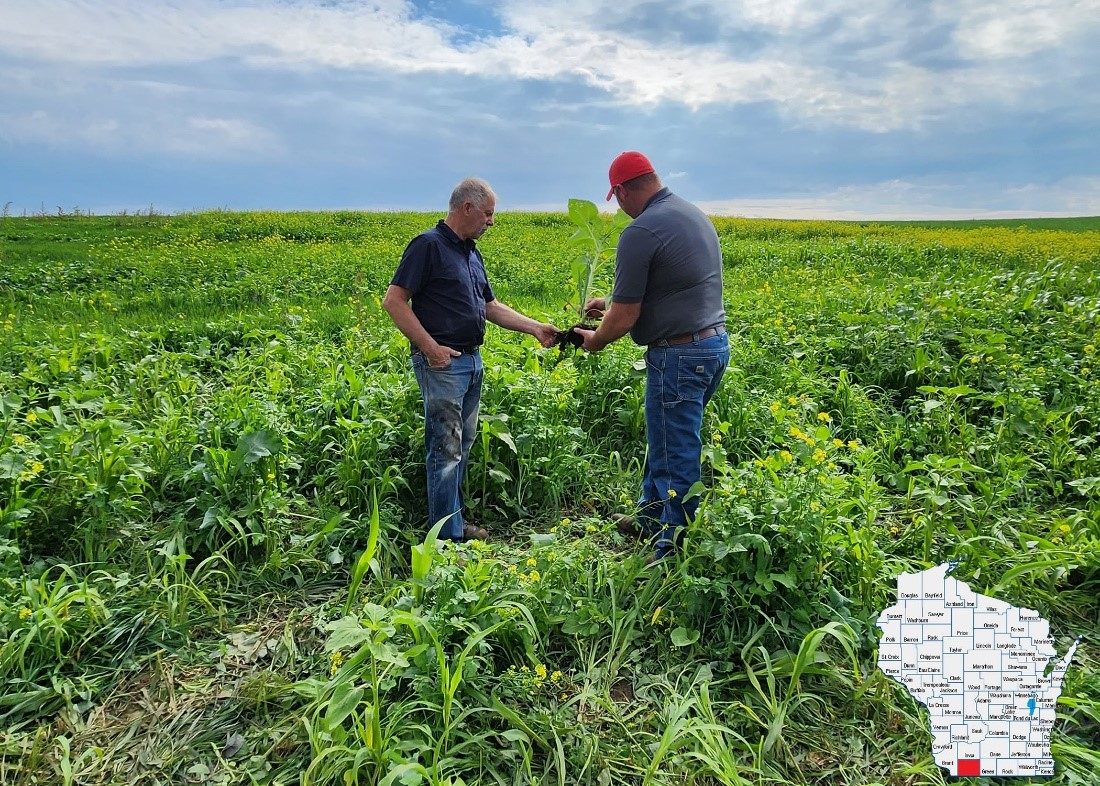
Four farms affiliated with the Lafayette Ag Stewardship Alliance (LASA) are Nitrogen Optimization Pilot Program (NOPP) grant recipients. Their project is designed to explore the following question: “What is the optimum N rate that maximizes profitable corn grain production and limits the risk of N loss to environmental factors when planted green into cereal rye cover crop?"
The group asserts that understanding the N cycle within a cover crop system is paramount to successful N management, noting that the N immobilization rate of cereal grain cover crops is expected to increase as the C:N ratio of cover crops increases.
Another motivating factor for pursuing NOPP funding is the opportunity to conduct local on-farm, field-scale research within the driftless region of Wisconsin. Due to a high risk of soil and nutrient runoff and nutrient leaching in this geography, this project will evaluate the N management requirements necessary to increase acres of cover cropping and no-till across the region. In addition, the ability for producers to conduct field-scale research on-farm offers increased validity and acceptance amongst growers compared to remote, small-plot research.
___________________________________________________________________________________________
September 19, 2023 - Turzinski
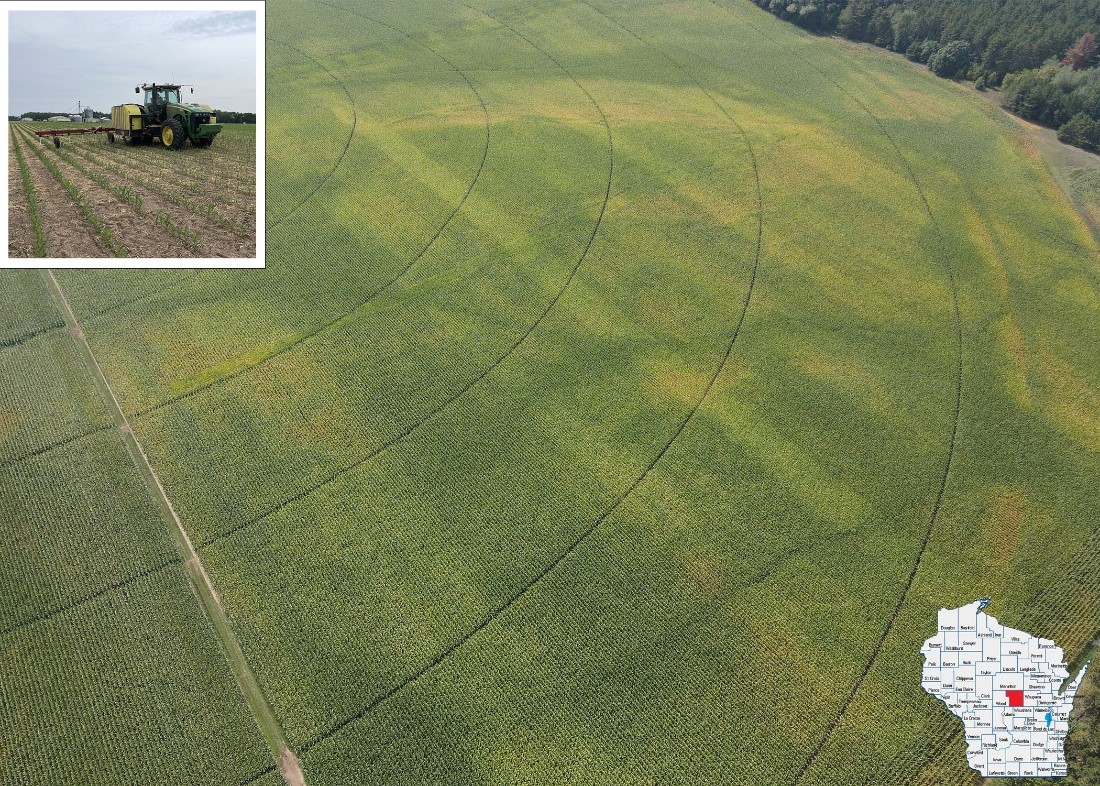
Nitrogen Optimization Pilot Program (NOPP) grantee, Trenton Towne, designed an on-farm project to investigate the benefits of winter grazing to corn yields while optimizing commercial nitrogen applications. After this year's corn is harvested, Towne will allow cattle to graze the trial location all winter and then establish the nitrogen-rate trial in the spring.
When asked what motivated him to design this unique project, Towne had no shortage of reasons: “Commercial nitrogen production uses significant amounts of fossil fuels. The cost of commercial fertilizer to a small farm's budget and to my children's future has motivated us to investigate how historical practices might help our farm reduce the need to use excessive amounts of commercial fertilizer. We also feel that properly managed grazing practices can help rejuvenate the sandy soils of Waushara County.
Our NOPP study looks to reintegrate cattle to the landscape, so that the cows can deposit nutrients where we need them most. We intend to use the practice of bale grazing during the long Wisconsin winters upon a field where corn has been harvested to prepare the soil with all the nutrients necessary for the coming growing season. We will then monitor how a variety of different nitrogen application rates across the field affect corn yields during the next year.
We hope that through this research, we can help small farms in central Wisconsin determine the financial benefits of such a rotational grazing system and hopefully reduce the need to purchase commercial nitrogen and expensive equipment. We believe that the long-term benefits of winter bale grazing in Wisconsin will improve our soil, our environment, our finances and our children's future."
___________________________________________________________________________________________
August 29, 2023 - Towne
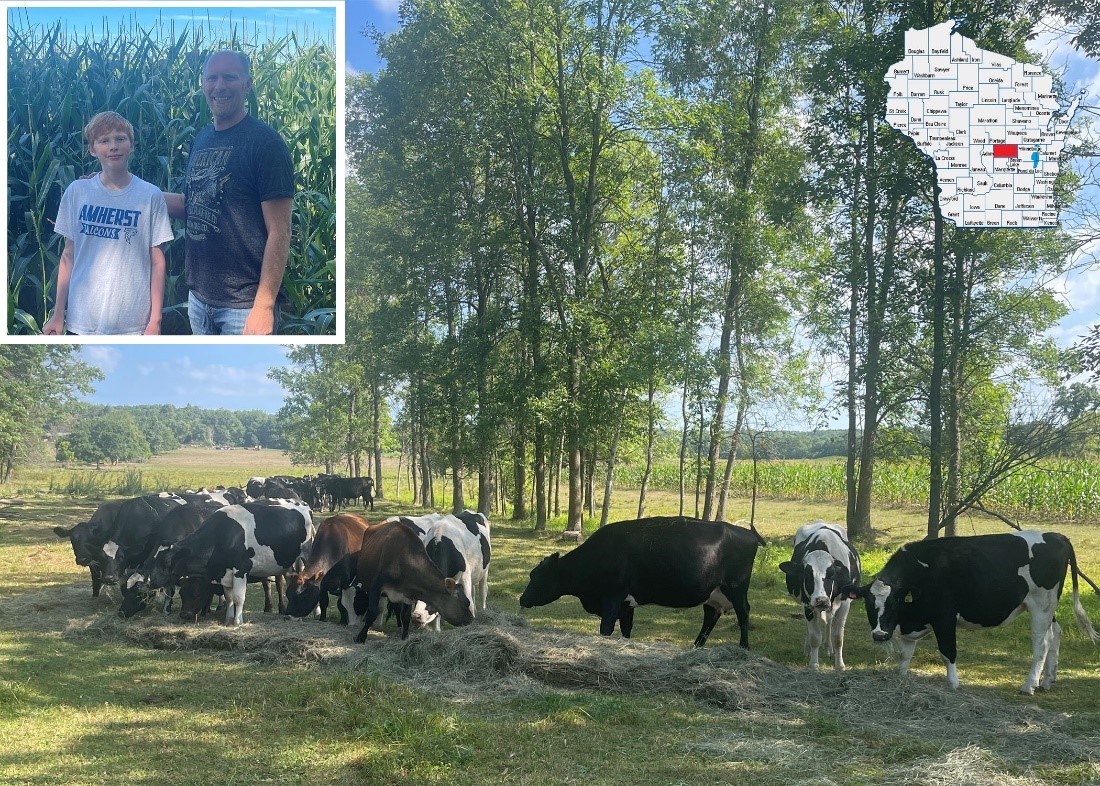
Pictured inset:Trenton Towne and son, Atticus
Nitrogen Optimization Pilot Program (NOPP) grantee, Trenton Towne, designed an on-farm project to investigate the benefits of winter grazing to corn yields while optimizing commercial nitrogen applications. After this year's corn is harvested, Towne will allow cattle to graze the trial location all winter and then establish the nitrogen-rate trial in the spring.
When asked what motivated him to design this unique project, Towne had no shortage of reasons: “Commercial nitrogen production uses significant amounts of fossil fuels. The cost of commercial fertilizer to a small farm's budget and to my children's future has motivated us to investigate how historical practices might help our farm reduce the need to use excessive amounts of commercial fertilizer. We also feel that properly managed grazing practices can help rejuvenate the sandy soils of Waushara County.
Our NOPP study looks to reintegrate cattle to the landscape, so that the cows can deposit nutrients where we need them most. We intend to use the practice of bale grazing during the long Wisconsin winters upon a field where corn has been harvested to prepare the soil with all the nutrients necessary for the coming growing season. We will then monitor how a variety of different nitrogen application rates across the field affect corn yields during the next year.
We hope that through this research, we can help small farms in central Wisconsin determine the financial benefits of such a rotational grazing system and hopefully reduce the need to purchase commercial nitrogen and expensive equipment. We believe that the long-term benefits of winter bale grazing in Wisconsin will improve our soil, our environment, our finances and our children's future."
___________________________________________________________________________________________
August 15, 2023 - Joe Bragger

Pictured Inset L to R: Cora Hoffer, Doug Yapp, Carl Duley, Jimmy Ellis, Joe Bragger, Dr. Francisco Arriaga
Nitrogen Optimization Pilot Program (NOPP) grant recipient Joe Bragger, along with fellow producer Jimmy Ellis, are conducting on-farm research investigating the optimization of urea applications when applying poultry litter to corn.
The poultry industry has undergone major changes over the last 20 years and very little research has been conducted on nitrogen availability in poultry litter in that timeframe. At a recent field day hosted at the trial, Jimmy Ellis said they want to “put it to rest once and for all: Is it the manure handling, the housekeeping, what they're feeding the chickens? What has changed?"
As commercial poultry production is extremely important in west central Wisconsin and poultry litter is routinely applied to sensitive soils in this area of the Driftless Region, this two-year project should provide valuable information on the topic.
___________________________________________________________________________________________
August 1, 2023 - McCain

Pictured: A suction cup lysimeter installed within the bounds of the trial to measure water and nutrient movement in the soil.
With their Nitrogen Optimization Pilot Program (NOPP) grant, Coloma Farms & Plover River Farms, in collaboration with McCain Foods, seek to enhance nitrogen management in potatoes.
“Potatoes have a high demand for nitrogen and water, and many are grown in quite sandy soils, which can lead to nitrogen loss via nitrate leaching," says Kelly Verhaalen of McCain Foods. That risk of leaching is the “why" behind this project.
Verhaalen continues: “Potato growers have practiced split nitrogen applications for a long time, but there is still uncertainty to understanding how much nitrogen is lost to leaching from either at planting, hilling, or fertigation applications. Also, nitrogen demand within a season in relation to yield can be quite variable between potato varieties and still needs research. We hope to understand how a specific processing russet variety's yield and quality responds to nitrogen rates and fertigation timings while also measuring the nitrogen balance within the season and how the crop rotation may have influence. Ideally, we'd then be able to focus on more potato varieties and their nitrogen relationship."
__________________________________________________________________________________________
July 18, 2023 - WWCC
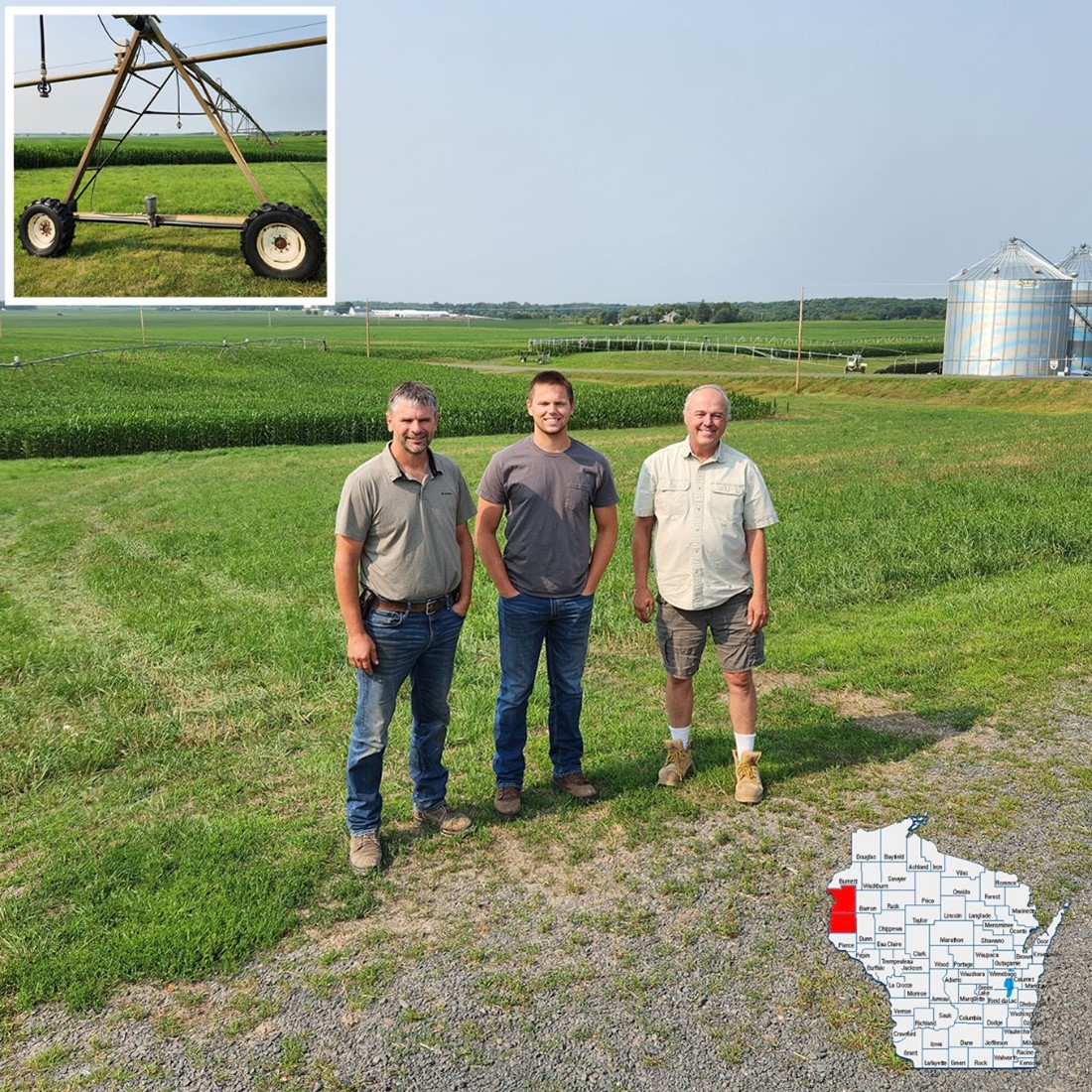
Pictured: Scott Carlson, Nick Carlson, and Dave Tollberg. Not pictured: Ter-Rae Farms.
The Western Wisconsin Conservation Council (WWCC) is a Nitrogen Optimization Pilot Program (NOPP) grant recipient studying nitrogen rates for four years under irrigation in western Wisconsin. The Horse Creek Watershed Council and Dry Run Watershed Council are both represented in this project.
Crop consultant Dave Tollberg had this to say about the project: "We designed this project so that it's not a lot of extra work for the farmers and, because the fields are under irrigation, we'd still have good data on dry years. Lysimeters were installed and will be monitored by Dr. Jill Wasik (UW-River Falls) to measure nitrogen leaching. Dr. Susanne Wiesner (UW-River Falls) will be correlating yield and quality data to remote sensing data. Deep nitrate and Haney samples have been taken to correlate nitrogen recommendations to best nitrogen rate yield
s."
___________________________________________________________________________________________
June 27, 2023 - Red Cedar
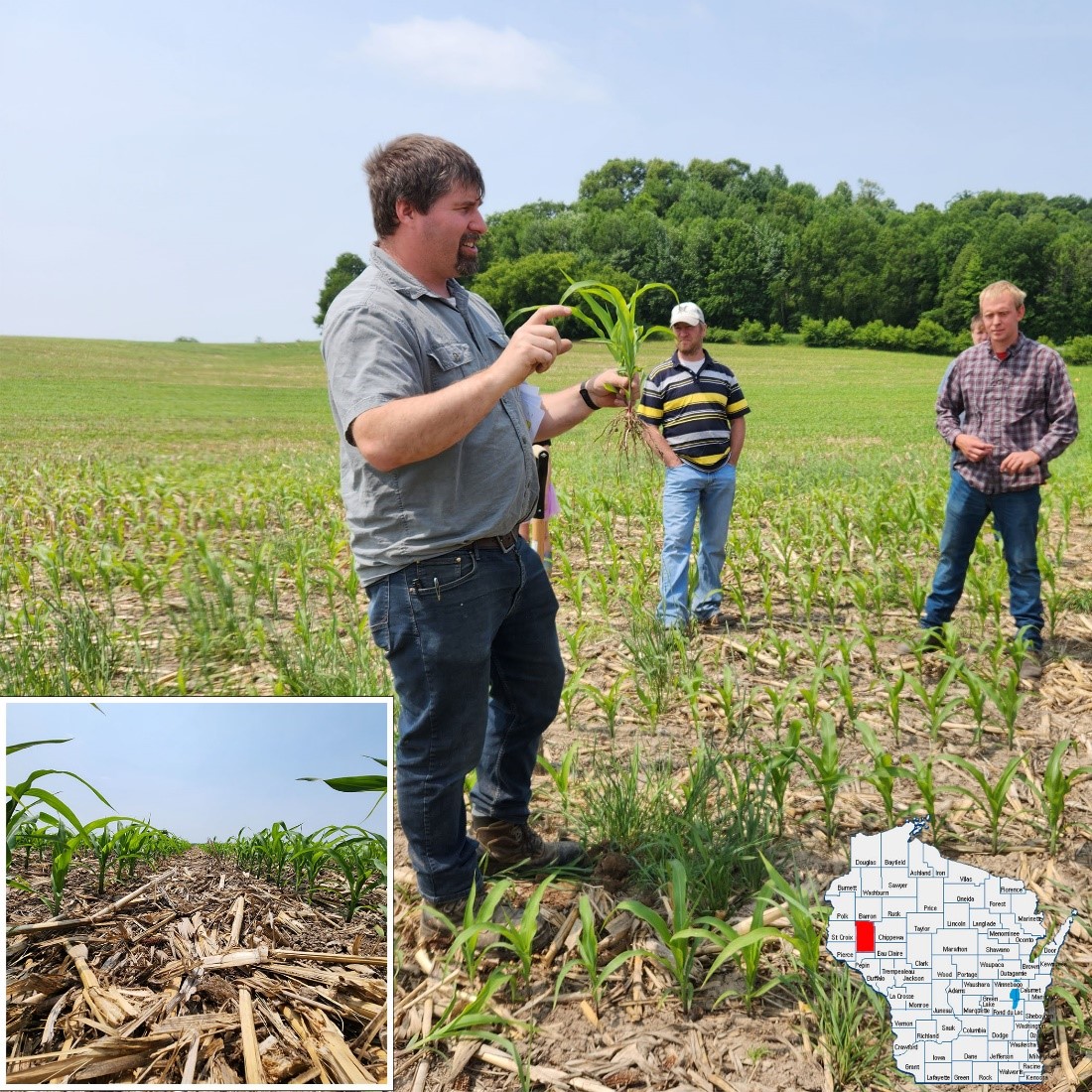
The Red Cedar Conservation Farmers (RCCF) watershed group is a Nitrogen Optimization Pilot Program (NOPP) grant recipient. This group of four producers is studying the effects of cover crop termination and cover crop tillage separately on nitrogen use efficiency.
Tryston Beyrer, a producer on the project said “We found that, through some of our watershed's groundwater sampling, we've had some wells that came back high in nitrate. In general, we have found some of our sandier soils, primarily but solely in this region closer to the Red Cedar, have been a little bit higher in nitrate, so if we can better optimize our nitrogen recommendations through the NOPP group, we might have some new interesting findings that we can share with the group and surrounding areas. Working with UW and with the Red Cedar Conservation Farmers group has been good and we've got a few different producers – Mike, myself, Jeco, and Bill. All of us have different fields that are conducting trials to increase nitrogen efficiency while considering the effect of other management practices such as cover crops, tillage, etc."
Dunn County Land and Water Conservation Division employee Tina Barone is supporting the project as the Fiscal Manager. She worked with the four RCCF members to apply for the grant and will manage the grant by helping with sampling, managing data collection, and making payments for the group.
___________________________________________________________________________________________
June 13, 2023 - Weichmann
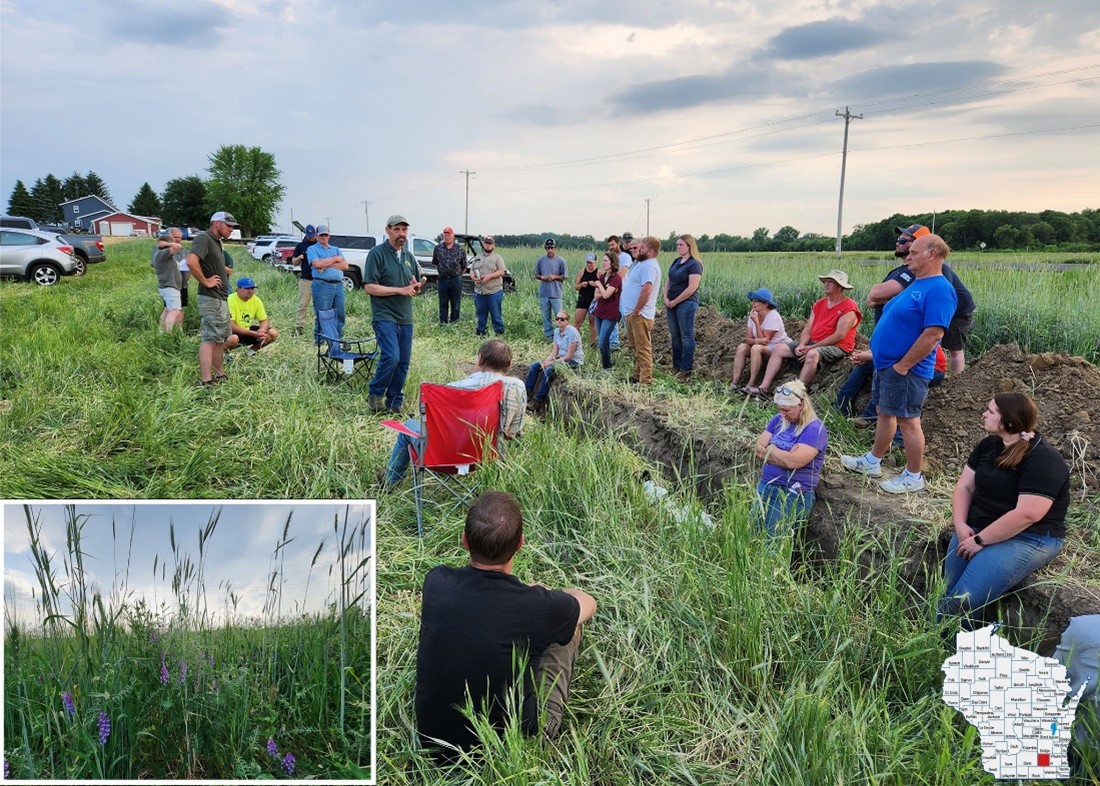
Nitrogen Optimization Pilot Program (NOPP) grant recipient Dean Weichmann is exploring nitrogen crediting to corn from two different cover crop mixes.
In response to why he chose to conduct on-farm research, Dean insightfully says “We need to continually update research, without data it's like driving in the dark and turning out the lights. Climate is changing, agronomy is changing. Our needs change. Costs, including what we recognize as the cost of runoff and pollution change as well."
Crop consultant Tom Novak collaborates on Dean's project and notes that “Historically we have had reliable UW-generated data on N credits from alfalfa and frost-seeded red clover in wheat. What's missing is how much N can we generate from seeding high-legume mixes in late July after wheat grain and straw are harvested? NOPP Trials such as Dean's will move us from testimonials of what we think happens to knowing what happens."
___________________________________________________________________________________________
May 30, 2023 - Albright
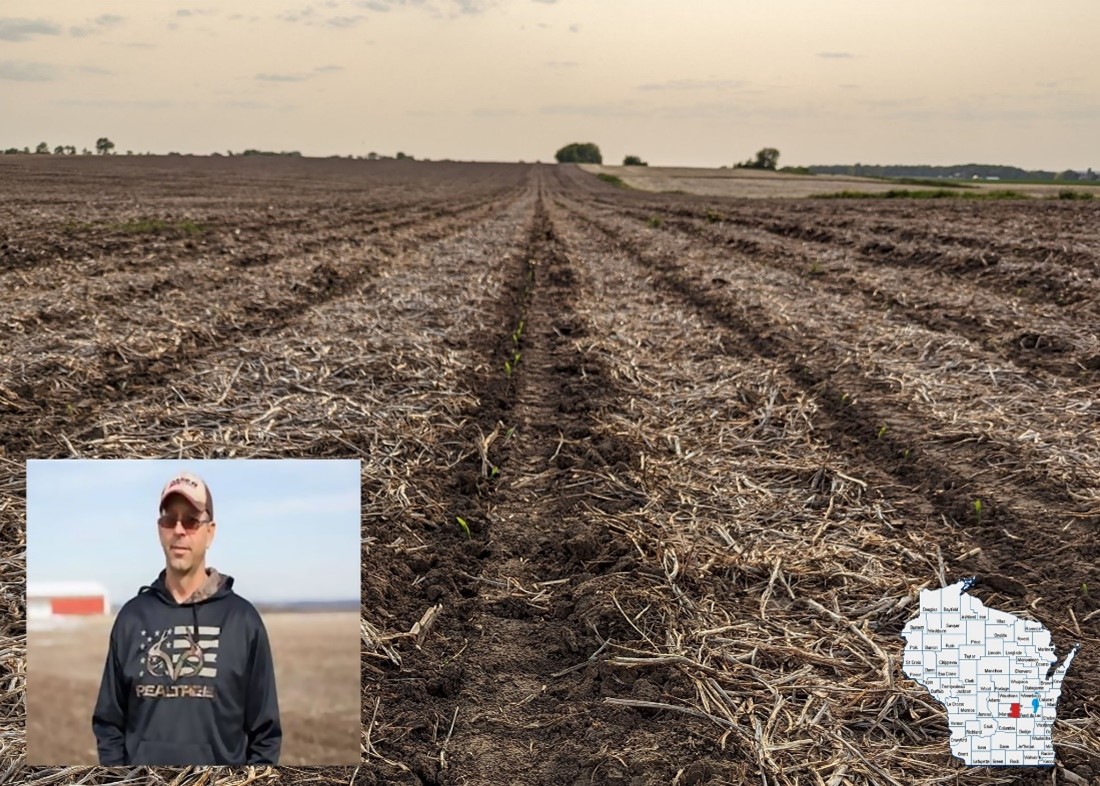
Dave Albright is a Nitrogen Optimization Pilot Program (NOPP) grant recipient exploring variable nitrogen application on his farm using the Augmenta System. Dave is working closely with Extension on his NOPP project.
When asked about his inspiration for applying for an NOPP grant, Dave said “I felt like farming in the Green Lake watershed. I want to be able to use the least amount of nitrogen and other fertilizer while still getting a good crop. This study is one way to figure out what those parameters might be."
UW-Extension Educator Natasha Paris said “I am excited to work with Dave and I think this project is interesting because it explores a new technology in the world of nitrogen optimization in an on-farm context."
___________________________________________________________________________________________
May 16, 2023 - Cranberry Creek
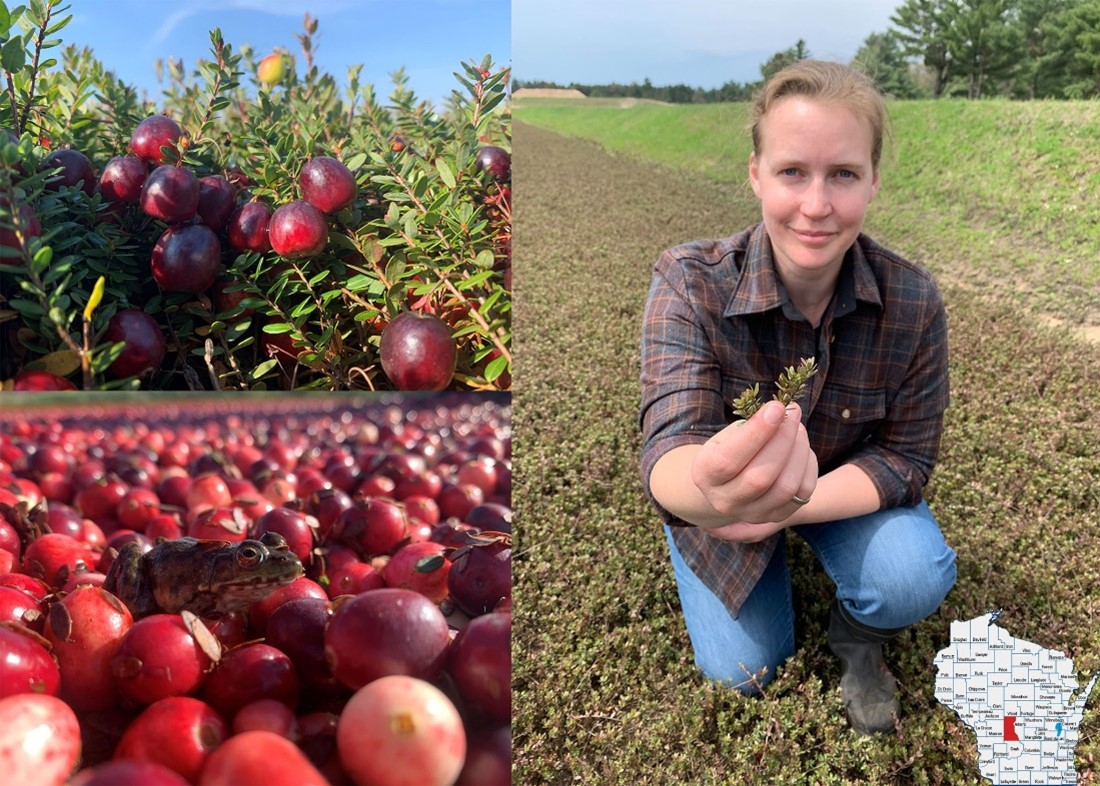
Nicole Hansen with Cranberry Creek is a Nitrogen Optimization Pilot Program (NOPP) grant recipient investigating nitrogen application timing in Wisconsin cranberry marshes. Nicole is working closely with UW-Extension on her NOPP project.
When asked about the implications of on-farm research for cranberries, Allison Jonjak, Cranberry Outreach Specialist with the Division of Extension (pictured here) had this to say: “University research on nitrogen fertilizer timing in cranberries is difficult because application logistics are hard to replicate in a lab, and nitrogen timing is very reliant on a grower's logistics capabilities. The provision of funds for field-scale, on-marsh research using cranberry growers' actual application equipment is the first opportunity we have had to research nitrogen application timing in a way that will help growers become even better stewards of their businesses, vines, land, and water."
___________________________________________________________________________________________
May 2, 2023 - Ailts
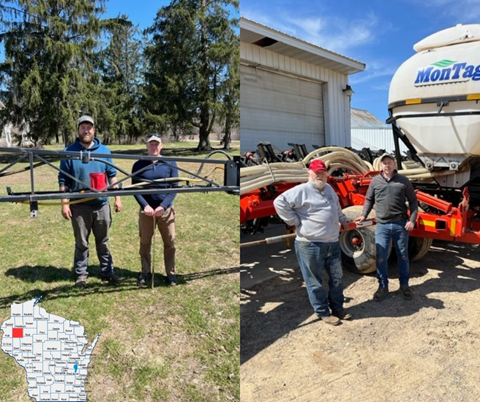
The Nitrogen Optimization Pilot Project (NOPP) is underway! Logan Dwyer, Joe Ailts, Andy Bensend, and his farm manager Josh Schloneger are NOPP grant recipients who will explore organic and inorganic nitrogen soil testing to reduce nitrogen applications.
When asked why he chose to apply for funding to perform on-farm trials, crop consultant Joe Ailts said “Updates to the way we assess and manage nitrogen in corn are long overdue. The NOPP grant has provided the framework, funding, and motivation to determine if and how emerging nitrogen measures can be used to 'do nitrogen better.'"
Producer Andy Bensend added “How often do we get to build on our business efficiency while also providing a real way to help our industry be more environmentally sound?"
<< Back to the NOPP homepage